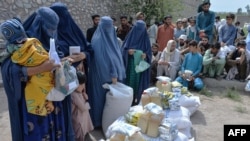United Nations agencies say they intend to stay in Afghanistan to provide aid to millions of Afghans facing the impending fall of the country to Taliban insurgents.
United Nations agencies are pledging to remain in Afghanistan as urban areas, especially the capital, Kabul, are overflowing with people who have fled Taliban offensives in rural parts of the country.
Jens Laerke, spokesman for the U.N. Office for the Coordination of Humanitarian Affairs, says the U.N. has been in Afghanistan uninterrupted for the last 70 years and it is still there. He says the U.N. is concerned about the safety of its international and national staff and is closely monitoring events to ensure they are protected.
“Of course, it is a very volatile, fluid, rapidly changing situation," he said. "But we are staying where we are. We have all intentions to stay and deliver for the Afghan people. The deal that we have in Afghanistan is with the Afghan people, with the civilians. And we are there to stay and help them.”
The United Nations has 720 staff assigned to Afghanistan. About 300 U.N. staff members are on the ground in the country. The rest are working remotely because of the COVID-19 pandemic. OCHA coordinates much of the humanitarian assistance that has been provided by 156 U.N. and nongovernmental agencies to 8 million Afghans this year.
Laerke says there has been a surge of displacement since May. This coincides with the accelerated withdrawal of U.S. and NATO troops from Afghanistan. Before the exodus began, he says 21,000 displaced people were recorded in Kabul.
Now, he says thousands more people are rushing into the capital. He says most have no place to sleep and the delivery of aid is becoming more difficult. He says missions are being conducted to assess the needs.
“As humanitarians, we will engage with anyone including the Taliban if it pertains to accessing people in need and if that… is based fully and firmly on the core humanitarian principles of complete neutrality, impartiality, and independence of delivery,” he said.
The U.N. refugee agency, one of the agencies working in Afghanistan, has assessed the needs of nearly 400,000 people who have become newly uprooted this year. The agency is providing food, shelter, hygiene, and other aid.
The World Food Program reports it is increasing food assistance programs to reach 9 million acutely hungry people through December.
The World Health Organization reports violence induced trauma is a major public health concern. Consequently, it says it is supporting trauma care in 130 facilities. It says it also is supporting blood banks and training health workers on mass-casualty management.








